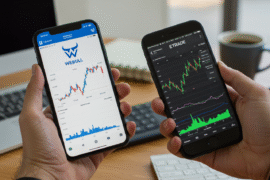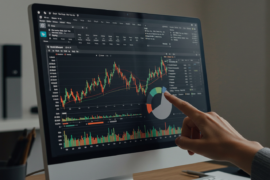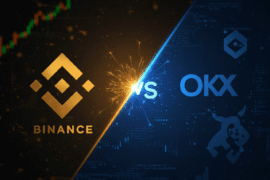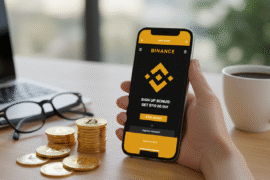This article may contain references to products or services from one or more of our advertisers or partners. We may receive compensation when you click on links to those products or services. Nonetheless, our opinions are our own.
The information presented in this article is accurate to the best of our knowledge at the time of publication. However, information is subject to change, and no guarantees are made about the continued accuracy or completeness of this content after its publication date.

Updated by Albert Fang
Multiple sectors are finding uses for blockchains. It has been reported by several of the first owners that innovation is helping companies get ahead of the competition. Because of the obvious advantages to business processes, more and more organizations will use the technology.
This technology not only allows for quick payments across peer-to-peer networking and cuts out the intermediaries, but it also employs identification to safeguard data and makes it tougher to crack than any previous method.
Blockchain-based cryptocurrencies allow immediate, worldwide transactions between users. This reduces transaction costs by doing away with the requirement for intermediary institutions.
Now more than ever, businesses are turning to blockchain technology to improve data security, streamline operations throughout their supply chains and logistical networks, and effectively manage their trade secrets. Blockchain is indeed employed in the general public, the maintenance of medical records, crowdsourcing and investing via security token offerings, and in the food industry.
Several Use Cases For Blockchain
Blockchains include the well-known digital currencies Bitcoin and Ethereum. To participate in a blockchain transaction, one just needs access to a device that can connect to the network. There is a finite quantity of currencies that may ever be distributed over all blockchains, and this distribution occurs gradually over time.
Blockchain Wallets
As the title indicates, blockchain participants utilize mobile wallets to keep their resources on a specific blockchain. The funds you earn from Bitcoin mining, for example, will be transferred to the wallet of your choice. Bitcoins purchased via peers or crypto exchanges like Bitalpha AI are delivered to the buyer’s wallet. The software works on a broad variety of computers and mobile devices.
Wallets are standalone programs developed on the blockchain that may be installed on your computer in addition to the blockchain itself, or utilized as browser add-ons, extensions, or hardware. Not all cryptocurrency wallets are created equal; maybe let you save many coins, whereas others enable you to save just the commodity for a single blockchain.
Blockchain Cryptocurrencies
Cryptocurrency is a kind of digital money that is protected by encryption and may be owned, stored, traded, and exchanged between users inside a decentralized peer-to-peer ledger called a blockchain.
Bitcoin, Ethereum, as well as over 5,000 additional cryptocurrency assets and coins are not subject to regulation by any state, unlike fiat money like the dollars, euros, and yuans.
Blockchain DAO
The highest-level software system currently available is called a Decentralized Autonomous Organization. It’s a company whose operations are governed by predetermined software code and where the exchange documents are kept on a public ledger called the blockchain. Investors establish the guidelines and, for sure, run the show without interference from the state.
Members may propose legislation and concur on the laws, and wealth could be freely exchanged among them. Include human-to-human communication, human-to-human communication, and device-to-device communication, and things may become complicated quickly.
Voted "Best Overall Budgeting App" by Forbes and WSJ
Monarch Money helps you budget, track spending, set goals, and plan your financial future—all in one app.
Get 50% OFF your first year with code MONARCHVIP
Is Blockchain Integration Necessary?
Here are some of the explanations:
- Financial advantages: Blockchain integration may reduce operating and transactional expenses by over 50% for most businesses. However, you are required to have automated your processes beforehand, since blockchain is not only for automation.
- Using blockchain technology, payments are open, which aids in preventing both internal and external crime toward your business. Due to the continuous nature of operations, accounting fraud can never be concealed.
- Adoption of solely automated systems: Blockchain is going to be expensive compared to any other automated systems, making it a poor choice if automating tasks is the main goal.
- In addition, you may want to think about using a digital application (dApp) or a consortium blockchain to streamline your business dealings and make sure that all parties involved in the exchanges follow the terms of the contracts they enter into.
Conclusion
Nearly every aspect of the industry is finding a use for blockchain technology, spanning cryptocurrency, supply chains and transportation, administration of property rights, database administration in pharmaceutical and food backup systems, crowdfunding and finance via the use of security token offerings, and notary services.
Smart contracts allow businesses to employ automation for pay-for-performance agreements. Transactions can be seen by all parties involved, records cannot be lost, fraud cannot occur, and the books cannot be “cooked” thanks to digital ledgers. It may streamline monetary exchanges and reduce transaction costs across countries.

Reviewed and edited by Albert Fang.
See a typo or want to suggest an edit/revision to the content? Use the contact us form to provide feedback.
At FangWallet, we value editorial integrity and open collaboration in curating quality content for readers to enjoy. Much appreciated for the assist.
Did you like our article and find it insightful? We encourage sharing the article link with family and friends to benefit as well - better yet, sharing on social media. Thank you for the support! 🍉
Article Title: Learning The Concept OF Blockchain Applications
https://fangwallet.com/2022/12/13/learning-the-concept-of-blockchain-applications/The FangWallet Promise
FangWallet is an editorially independent resource - founded on breaking down challenging financial concepts for anyone to understand since 2014. While we adhere to editorial integrity, note that this post may contain references to products from our partners.
The FangWallet promise is always to have your best interest in mind and be transparent and honest about the financial picture.
Become an Insider

Subscribe to get a free daily budget planner printable to help get your money on track!
Make passive money the right way. No spam.
Editorial Disclaimer: The editorial content on this page is not provided by any of the companies mentioned. The opinions expressed here are the author's alone.
The content of this website is for informational purposes only and does not represent investment advice, or an offer or solicitation to buy or sell any security, investment, or product. Investors are encouraged to do their own due diligence, and, if necessary, consult professional advising before making any investment decisions. Investing involves a high degree of risk, and financial losses may occur including the potential loss of principal.
Source Citation References:
+ Inspo











































